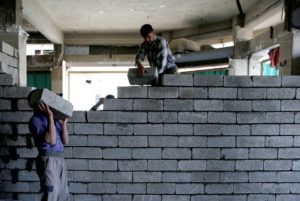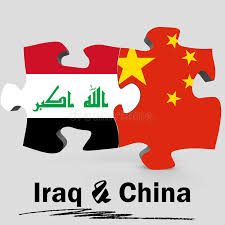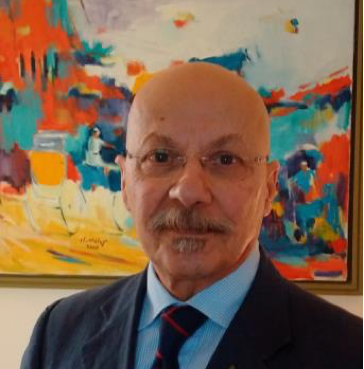
The dilemma is that it needs money—and will inevitably lose some to corruption.
On Sunday, Haider al-Abadi, the prime minister of Iraq, visited Mosul to herald the success of his army’s nine-month struggle to recapture the city from the Islamic State. In a speech on state television the next day, he declared “the end and the failure and the collapse of the terrorist state of falsehood and terrorism which [ISIS] announced from Mosul.” Even as pockets of militants continue to hold out in the Old City, the government is now effectively in control of both East and West Mosul. The capture of the Great Mosque of al Nuri, which sits at the heart of the Old City, on the west bank of the Tigris river, was a symbolic victory, since it was from this mosque that Abu Bakr al-Baghdadi, the head of Islamic State, declared the foundation of the caliphate.
But the mosque also represents the scale of the challenge now facing Iraq. Before its capture, ISIS fighters blew up its iconic leaning minaret— an act described by Abadi as “an official acknowledgment of defeat.” At its height, ISIS controlled 40 percent of Iraqi territory, terrorizing a population of 10 million. The recapture of that territory, with only the towns of Hawija and Tal Afar remaining in ISIS hands, has seen the displacement of 3 million people, and over 13,000 coalition airstrikes. Combined with ISIS’s penchant for systematically carpeting towns with IEDs, a vast swathe of Iraq, including the al-Nuri Mosque, lies in ruins.
Prior to falling to ISIS in June 2014, Mosul was a center for medium-sized Iraqi industries. The city hosted pharmaceutical factories, and an abundance of craftsmen who made furniture, instruments, leather goods, and textiles. ISIS repurposed many of the city’s workshops to produce IEDs. Consequently they have been devastated in the fighting. Mosul’s modern pharmaceuticals factory, for example, was bombed in 2016 by the coalition, after it was linked to the manufacture of chemical weapons by ISIS. The restoration of these industries is crucial to bringing the city back to life.
What emerges from the rubble will determine the future of Iraq. If the government fails to provide services and security from militias seeking revenge, the recapture of Mosul could simply set up the next round of Sunni insurgency. But if the government can lure investment and reignite Mosul’s local economy, then its liberation could mark a turning point from one of the darkest chapters in Iraq’s history.
Earlier this month, the Iraqi government held a conference in London that brought Iraqi and foreign business owners together with government officials and experts to discuss the opportunities and barriers to developing the country’s economy. “Now we need a Marshall Plan,” Ibrahim al Jaafari, Iraq’s foreign minister, declared in his opening remarks—a reference to America’s massive reconstruction program following World War II. He argued that such a plan wouldn’t just be sensible policy, but an obligation of the international community. “Over a hundred nationalities came to Iraq as terrorists. Iraq is fighting to protect itself and on behalf of the whole world,” he said.
Western officials are sympathetic, not least because a peace dividend, in which citizens in liberated areas feel the immediate benefits from the return of government control, is considered essential to stave off a resurgent Sunni uprising. “The danger is to win the war but lose the peace,” Greg Hands, Britain’s minister of state for trade and investment, said in response to Al Jaafari’s remarks.
While all parties seem to recognize that a lasting peace depends on the Iraqi government quickly establishing services in liberated areas, international aid and investment has been sparse. The UN has called for $985 million to provide for immediate humanitarian needs—not to finance reconstruction. So far, only $423.5 million has been pledged. Estimates of the cost of reconstruction vary widely, but Iraqi officials are discussing a plan that would cost around $100 billion—just over half the total cost of the Marshall Plan, adjusted for inflation, which supported the reconstruction of Western Europe.
The international community’s reluctance stems, in part, from its skepticism over Baghdad’s capacity to properly distribute the funds. The Marshall Plan saw extensive American oversight of the process, in order to ensure that funds were spent effectively, and in line with U.S. interests at the onset of the Cold War. In Iraq, security concerns prevent western officials from maintaining a sustained presence to oversee projects.
The Iraqi government is looking to fill the gap with private investment, both because this could help establish long-term business relationships with foreign countries, and because individual investors, eager to make money, will, theoretically, be careful to make sure their money is properly spent. Baghdad is seeking to promote partnerships between foreign companies and lenders, with Iraqi firms, to redevelop the country’s infrastructure. These efforts have been well received abroad. The United Kingdom has made some $12 billion dollars available to support private investment in Iraqi infrastructure, through U.K. Export Finance, its export credit agency. But private investment is not charity. “There is no question that we’re eager to support them,” Louis Taylor, head of the agency, said at a recent event with Iraqi business owners. “But we need projects that will bring a financial return.”
What worries British investors is that their potential business partners in Iraq have yet to provide sufficiently detailed proposals to convince them that they will make money. Ambiguous business proposals, investors fear, will allow money to be siphoned off to local officials. “The legal paperwork must be protected. We need to know who we are doing business with,” Raed Hanna, director of Mutual Finance, which supports investment projects in Iraq, explained to me.
One inconvenient, generally accepted truth, is that doing business in post-conflict territories and emerging markets necessitates some measure of corruption. Privately, business owners acknowledge that it simply is not possible to do business in Iraq without paying bribes. The country remains vulnerable to clientelism, in part because of the public sector’s dominance of the Iraqi business environment. The result is that political power often rests with whoever can provide his supporters with lucrative government contracts. All this contributed to Iraq coming in at 166 out of 176 countries in Transparency International’s 2016 corruption index.
While it’s relatively easy for large companies in the oil and gas sector to factor the cost of corruption into their investments, the costs for investors in small-and-medium-sized businesses can be crippling. The costs of obtaining all the necessary permissions to set up the business may outweigh any potential profits, especially if a local official has a client who is a potential competitor. Yet manufacturing and medium-sized enterprises are the ones that have the capacity to deliver employment to liberated areas.
Iraq also needs private industry to flourish in order to expand its tax base and diversify the economy: The oil industry accounts for 99 percent of government revenues. Fluctuations in the price of oil cause huge fluctuations in the available funds for the budgets of government departments. At present, with oil below $45 per barrel, “Life has economically almost stopped. Our bureaucracy has taken much of our resources in order to waste them,” Sami al Araji, chairman of Iraq’s National Investment Commission, explained to me.
Al Araji believes that Iraq must diversify its economy, both to expand and broaden the job market, and also to provide a stable tax base. For this to happen, Baghdad needs to relinquish control of its monopolies. The government dominates the oil, energy, and service sectors through government-owned companies. In a bid to increase revenues, the state has often tried to compete aggressively with private firms, rather than support private sector growth. The Iraqi State Company for Land Transportation, for example, has doubled its profits since 2011, largely at the expense of private firms. “Not everything can be a part of mega projects. You have to have a private sector that is a productive element in society, not dependent upon government contracts,” al Araji said.
The growth of the small and medium-sized enterprises that Iraq needs, however, will only come with foreign investment. That’s because domestic banks are extremely risk-averse, and rarely lend money to local businesses. Often, they only offer loans to businesses that own their own land, and can offer it up as collateral—an unrealistic proposition for them, given that most don’t have the necessary capital. This leaves Iraqi businesses desperate for partnerships with foreign companies who can obtain capital.
Iraq’s rebuilding dilemma, then, is that, in order to rebuild, its small and medium-sized businesses must play a central role. But they require external investment, which will only arrive once investors are confident in the integrity of Iraqi institutions and the viability of projects. Getting to that stage depends on the Iraqi government embracing a radical program of privatization and economic reform, which, even during peacetime, would be ambitious.
Consider Iraq’s electrical sector. Generous subsidies drive down prices, leading to overconsumption by households, subjecting Iraqis to regular power outages. This, in turn, forces Iraqis to pay private diesel or petrol-powered generator firms. Prime Minister Abadi has sought to privatize parts of the energy sector and remove subsidies. In January, the Iraqi government signed a $1.4-billion dealwith General Electric to expand its power supply and modernize the country’s gas–powered turbines. More controversially, the government is looking to reduce the provision of subsidized electricity, shifting Iraqis onto paid contracts. “It may be politically unpopular,” al Araji said, “but we have to stop subsidies.” The less the government spends on salaries and subsidies, the more it can spend on new infrastructure, and on the liberated territories like Mosul, which is currently without electricity.
Iraq therefore stands at a pivotal moment. There is potential for serious economic reform to drive reconstruction, and thereby build a pathway for stabilizing the liberated territories. There is also a serious possibility that bureaucratic paralysis and corruption will undermine reform, prevent investment from entering the liberated areas, and that, without jobs or services, insurgency will renew with a vengeance. For now, international investors and foreign governments are cautious, waiting to see whether the investment environment improves. In the meantime, Iraq’s future is in Iraqi hands.
(*)Jack Watling is a freelance journalist.
Source:The Atlantic,
Download PDF: How Can Iraq Rebuild- By JACK WATLING








Comment here